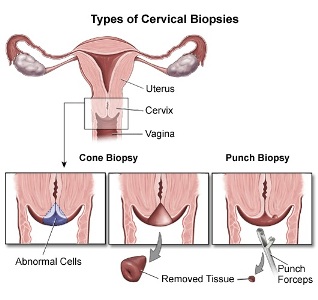During the cervical biopsy there is tissue removed from the cervix in order for the doctors to be able to analyze it.
This way the doctors can find the abnormal cells and also the precancerous cells, thus preventing different kinds of cancer, such as cervical cancer.
Types of biopsy of the cervix
We can be talking about different kinds of biopsies. While some of them are used only to remove some tissue for testing, during the other procedures the abnormal tissues can be entirely removed. Also during the procedure the specialists can treat for precancerous lesions.
 Punch cervical biopsy
Punch cervical biopsy
During this procedure there is a small piece of tissue removed from the cervix. There could be one or more biopsies preformed on one or more parts of the cervix.
Cone biopsy
The procedure is also known as conization. In this case there is a scalpel or laser used to remove a cone shaped tissue piece from the cervix.
Endocervical curettage
During this kind of biopsy of the cervix there is a narrow instrument used, known as the curette. The doctor uses this to scrape the lining of your endocervical canal. This is an area that cannot be seen from the outside of the cervix.
Reasons of the procedure
In the majority of the cases cervical biopsy is performed in case there are some abnormalities found during an examination. Such abnormalities can be found during a Pap test as well. Other reasons for the procedure include a positive test for HPV or for an STI. Some of the HPVs can cause cervical cancer or other, less common types of cancer.
Usually the biopsy of the cervix is done as part of a colposcopy procedure. Just as the name suggests this procedure is done with the help of a colposcope. This is a tool that comes with a special lens that allows magnifying the tissues.
Such a procedure can be used to find cervical cancer or precancerous cells. The cells that aren’t cancerous, but are abnormal are considered to be precancerous. In case there are some cells of this kind, it might be the first signs that you could face cancer after a few years.
There are some other treatments as well that can be diagnosed or treated with the help of cervical biopsy. These include polyps that can be found on the cervix, genital warts that are caused by HPV and that increase the chances of being affected by genital cancers or diethylstilbestrol exposure.
Risks of biopsy of the cervix
Since this is a surgical procedure, you should know that there is always the chance of facing complications. The most common complications include infection and bleeding. Besides this the cone biopsies could increase the chances of infertility and also miscarriage not to mention the scarring that could occur as a result of the procedure.
In case you happen to be sensitive to iodine, medications or latex, you should tell your doctor before cervical biopsy. Also if you happen to be pregnant or if you suspect that you are pregnant you should let your doctor know. There are some biopsies that can be performed in this case, while others cannot.
In the majority of the cases the procedures are scheduled about one week after your period. In case you have any medical conditions, these could represent some risks as well. There are some factors that could interfere with the procedure. Such interfering factors in case of the biopsy of the cervix include menstruation, inflammation of the cervix and pelvic inflammatory diseases.
Prior to the procedure
Before you start with the procedure your doctor will tell you what will happen during it and this is the time for you to ask questions and to speak about your concerns. Then you will have to sign a legal paper that states your agreement of having the cervical biopsy. Make sure that you read the document, and in case you have any questions, this is the time to ask them.
In the majority of the cases there is no need for sedation or fasting in case of a simple procedure. Nonetheless if it requires general or regional anesthesia, you will have to fast for a few hours. This usually happens after midnight.
It is possible that you have bleeding disorders, and this is something your doctor should know about in case of the cervical biopsy. Also tell your doctor if you are taking anticoagulant, aspirin or other medications that could have an effect on blood clotting.

